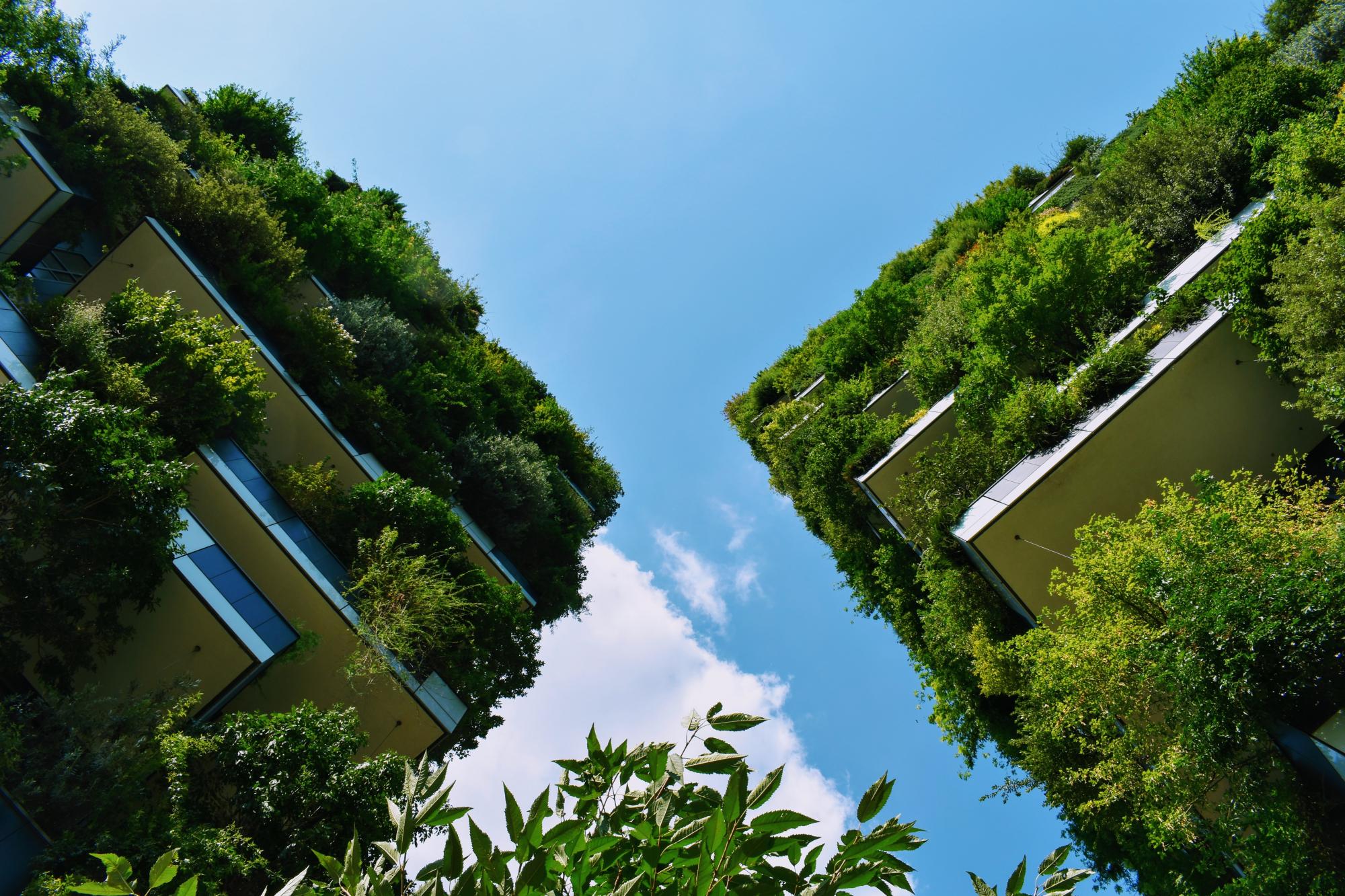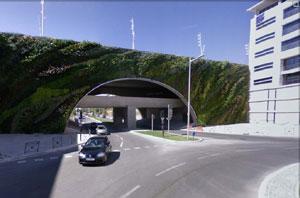Last updated: October 2021
In 2008, a green wall of more than 500 m^2 using a hydroponic watering system was developed on the side of the Max Juvenal bridge. Designed by Patrick Blanc, french botanist and pioneer in the development of green walls, it is considered an "authentic work of art, which evolves over time and the seasons and contributes to "renaturing" the urban space" (Ref. 4, page 7). The wall is intended to illustrate the benefits that green walls can bring to the environment, such as the reduction of heat islands in urban areas and their contribution to cleaner air due to the production of oxygen and the reduction of CO2 rate by photosynthesis (Ref. 1).
Overview
Nature-based solution
- Nature on buildings (external)
- Green walls or facades
Key challenges
- Climate action for adaptation, resilience and mitigation (SDG 13)
- Climate change adaptation
- Climate change mitigation
- Green space, habitats and biodiversity (SDG 15)
- Green space creation and/or management
- Environmental quality
- Air quality improvement
Focus
Creation of new green areas
Project objectives
-"It is for the visitor"... "a source of serenity and wonder in the heart of the urban space and the most futuristic areas of the city." (Ref. 3)
-"An authentic work of art, which evolves over time and the seasons and contributes to "renaturing" the urban space." (Ref. 4, page 7)
Implementation activities
"The principle is based on layers of felt in which the plants will root. The whole system is traversed by a network of pipes that brings a nutritive solution." (Ref. 3)
"We may just regret that the plants used are mainly tropical and not local." (Ref. 2)
"The vegetal wall at the Max Juvenal bridge illustrates the benefits that green walls can bring to the environment, such as the reduction of heat islands in urban areas and their contribution to cleaner air thanks to the production of oxygen and the reduction of CO2 rate by photosynthesis" (Ref. 1)
Climate-focused activities
Climate change adaptation:
- Increase or improve urban vegetation cover to help reduce outdoor temperature
- Create or improve outdoor spaces to help people escape from urban heat
Climate change mitigation:
- Install vertical or horizontal artificial surfaces that help with carbon storage and cooling
Main beneficiaries
- Local government/Municipality
- Citizens or community groups
Governance
Management set-up
- Government-led
Type of initiating organisation
- Local government/municipality
- Other
Participatory approaches/ community involvement
- Unknown
Details on the roles of the organisations involved in the project
The SEMEPA (the developer in charge of the works), under the direction of the Mayor of Aix-en-Provence, decided in 2007 to carry out 2 major works (a fountain and a vegetal wall).
"PATRICK BLANC, creator of the Vegetal Wall concept in France, was responsible for designing and conducting this project." (Ref. 3)
Project implemented in response to ...
... an EU policy or strategy?
Unknown
... a national policy or strategy?
Unknown
... a local policy or strategy?
Yes
("The mayor of Aix en Provence was behind this project, and it was originally planned to be a brick wall, but in the end they wanted this large-scale project to respond to the vegetal mass that is planted on the garden of "Aigle d'Or", south of the building the Aigle d'Or." (Ref. 3) )
Financing
Total cost
Unknown
Source(s) of funding
- Public local authority budget
Type of funding
- Earmarked public budget
Non-financial contribution
Unknown
Impacts and Monitoring
Environmental impacts
- Climate change
- Lowered local temperature
- Reduced emissions
- Strengthened capacity to address climate hazards/natural disasters
- Enhanced carbon sequestration
- Environmental quality
- Improved air quality
- Green space and habitat
- Increased green space area
- Increased number of species present
Economic impacts
- Unknown
Socio-cultural impacts
- Social justice and cohesion
- Improved liveability
- Improved access to urban green space
- Cultural heritage and sense of place
- Improvement in people’s connection to nature
- Increased sense of place identity, memory and belonging
Type of reported impacts
Achieved impacts
Presence of formal monitoring system
Unknown
Presence of indicators used in reporting
No evidence in public records
Presence of monitoring/ evaluation reports
No evidence in public records
Availability of a web-based monitoring tool
No evidence in public records
References
1. Institut National de Santé Publique Québec (n.d). "LES MURS VÉGÉTALISÉS : LE PONT MAX-JUVÉNAL À AIX-EN-PROVENCE". Available at: Source link (Accessed: 06, 07, 2020).
2. Anon. (n.d). "MUR VÉGÉTAL - MUR D'EAU". Available at: Source link (Accessed: 06, 07, 2020).
3. SEMEPA (n.d). "Un Mur Végétal en constante évolution". Actualités. Source link. Website not available in 2020.
4. Aix en provence (2013). "Aix-en-Provence, la métamorphose d’une ville". HORS-SERIE - Supplément aixendialogue n°58. Available at: Source link (Accessed: 06, 07, 2020).
2. Anon. (n.d). "MUR VÉGÉTAL - MUR D'EAU". Available at: Source link (Accessed: 06, 07, 2020).
3. SEMEPA (n.d). "Un Mur Végétal en constante évolution". Actualités. Source link. Website not available in 2020.
4. Aix en provence (2013). "Aix-en-Provence, la métamorphose d’une ville". HORS-SERIE - Supplément aixendialogue n°58. Available at: Source link (Accessed: 06, 07, 2020).

